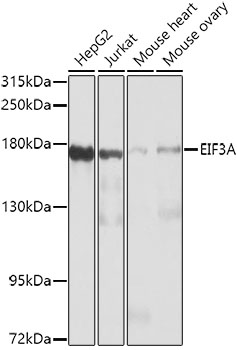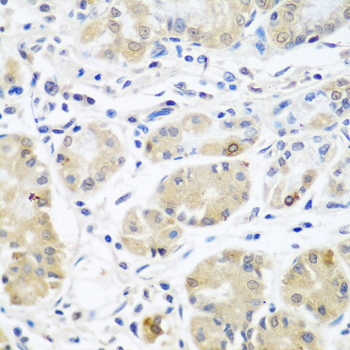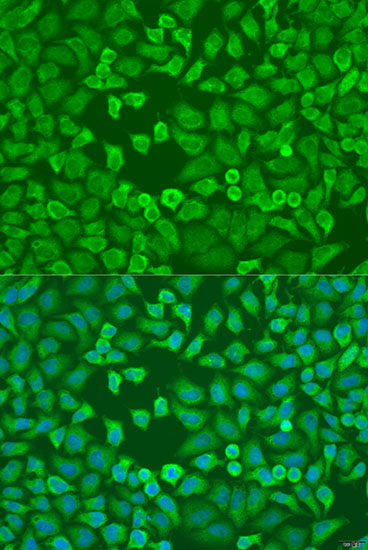-
Product Name
EIF3A Polyclonal Antibody
- Documents
-
Description
Polyclonal antibody to EIF3A
-
Tested applications
WB, IHC, IF
-
Species reactivity
Human, Mouse, Rat
-
Alternative names
EIF3A antibody; EIF3 antibody; EIF3S10 antibody; P167 antibody; TIF32 antibody; eIF3-p170 antibody; eIF3-theta antibody; p180 antibody; p185 antibody; eukaryotic translation initiation factor 3 subunit A antibody
-
Isotype
Rabbit IgG
-
Preparation
Antigen: Recombinant fusion protein containing a sequence corresponding to amino acids 1-250 of human EIF3A (NP_003741.1).
-
Clonality
Polyclonal
-
Formulation
PBS with 0.02% sodium azide, 50% glycerol, pH7.3.
-
Storage instructions
Store at -20℃. Avoid freeze / thaw cycles.
-
Applications
WB 1:500 - 1:1000
IHC 1:50 - 1:100
IF 1:50 - 1:100 -
Validations

Western blot - EIF3A Polyclonal Antibody
Western blot analysis of extracts of various cell lines, using EIF3A antibody at 1:1000 dilution.Secondary antibody: HRP Goat Anti-Rabbit IgG (H+L) at 1:10000 dilution.Lysates/proteins: 25ug per lane.Blocking buffer: 3% nonfat dry milk in TBST.Detection: ECL Basic Kit .Exposure time: 30s.

Immunohistochemistry - EIF3A Polyclonal Antibody
Immunohistochemistry of paraffin-embedded human stomach using EIF3A antibody at dilution of 1:100 (40x lens).

Immunofluorescence - EIF3A Polyclonal Antibody
Immunofluorescence analysis of U2OS cells using EIF3A antibody at dilution of 1:100. Blue: DAPI for nuclear staining.
-
Background
RNA-binding component of the eukaryotic translation initiation factor 3 (eIF-3) complex, which is required for several steps in the initiation of protein synthesis. The eIF-3 complex associates with the 40S ribosome and facilitates the recruitment of eIF-1, eIF-1A, eIF-2:GTP:methionyl-tRNAi and eIF-5 to form the 43S pre-initiation complex (43S PIC). The eIF-3 complex stimulates mRNA recruitment to the 43S PIC and scanning of the mRNA for AUG recognition. The eIF-3 complex is also required for disassembly and recycling of post-termination ribosomal complexes and subsequently prevents premature joining of the 40S and 60S ribosomal subunits prior to initiation. The eIF-3 complex specifically targets and initiates translation of a subset of mRNAs involved in cell proliferation, including cell cycling, differentiation and apoptosis, and uses different modes of RNA stem-loop binding to exert either translational activation or repression.; (Microbial infection) Essential for the initiation of translation on type-1 viral ribosomal entry sites (IRESs), like for HCV, PV, EV71 or BEV translation.; (Microbial infection) In case of FCV infection, plays a role in the ribosomal termination-reinitiation event leading to the translation of VP2.
Related Products / Services
Please note: All products are "FOR RESEARCH USE ONLY AND ARE NOT INTENDED FOR DIAGNOSTIC OR THERAPEUTIC USE"
